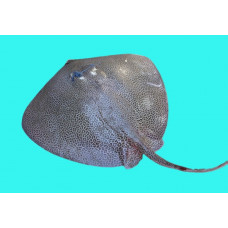Latin name
Himantura tutul
Other name
Himantura tutul
Identification
Himantura tutul was first scientifically described in 2013.
Features of fish fins
The pectoral fins of these stingrays fuse with the head to form a diamond-shaped disk that is slightly wider than long. The triangular snout is slightly elongated. Behind the widely spaced eyes are spiracles. On the ventral surface of the disk are 5 pairs of gill slits, mouth and nostrils. Between the nostrils is a flap of skin with a fringed lower edge. The mouth is arched, the protuberances at the bottom of the oral cavity are absent. Small, blunt teeth are staggered and form a flat surface. Skin folds on the caudal peduncle are absent. On the dorsal surface of the caudal peduncle there is a thin spike connected by ducts to the venom gland.
Fish colouring
The coloration of the dorsal surface of the disc is "leopard".
Distribution
Widespread in the Indo-West Pacific: from the coast of Tanzania to the Lakkadive Sea and the Indo-Malay Archipelago, including the area of the Strait of Sound, the southern coast of Java Island, the Bali Sea, the eastern part of the South China Sea and the Sulu Sea.
Habitat
A marine tropical pelagic-neritic species.
Size
Maximum length and width 115 cm.
Behavior
Bottom dweller, found near shore in areas with soft bottoms.
Food and feeding habits
A carnivorous species. Predator. There is no reliable information on diet. Diet includes zoobenthos.
Reproduction
Placental viviparous, their developing embryos are nourished by histotroph ("uterine milk") produced by the mother.
Fishing
Fine-spotted leopard sharks are not targeted. The conservation status of this species has not been assessed.
Relationship with a person
Harmless.
| Classification | |
| Phylum | Chordata |
| Class | Elasmobranchii |
| Squad | Myliobatiformes |
| Family | Dasyatidae |
| Genus | Himantura |
| Species | H. tutul |
| Features | |
| Conservation status | Not Evaluated |
| Habitat | Bottom |
| Life span, years | No information |
| Maximum body weight, kg | No information |
| Maximum length, cm | 115 |
| Sailing speed, m/s | No information |
| Threat to people | Not edible |
| Way of eating | Predator |

